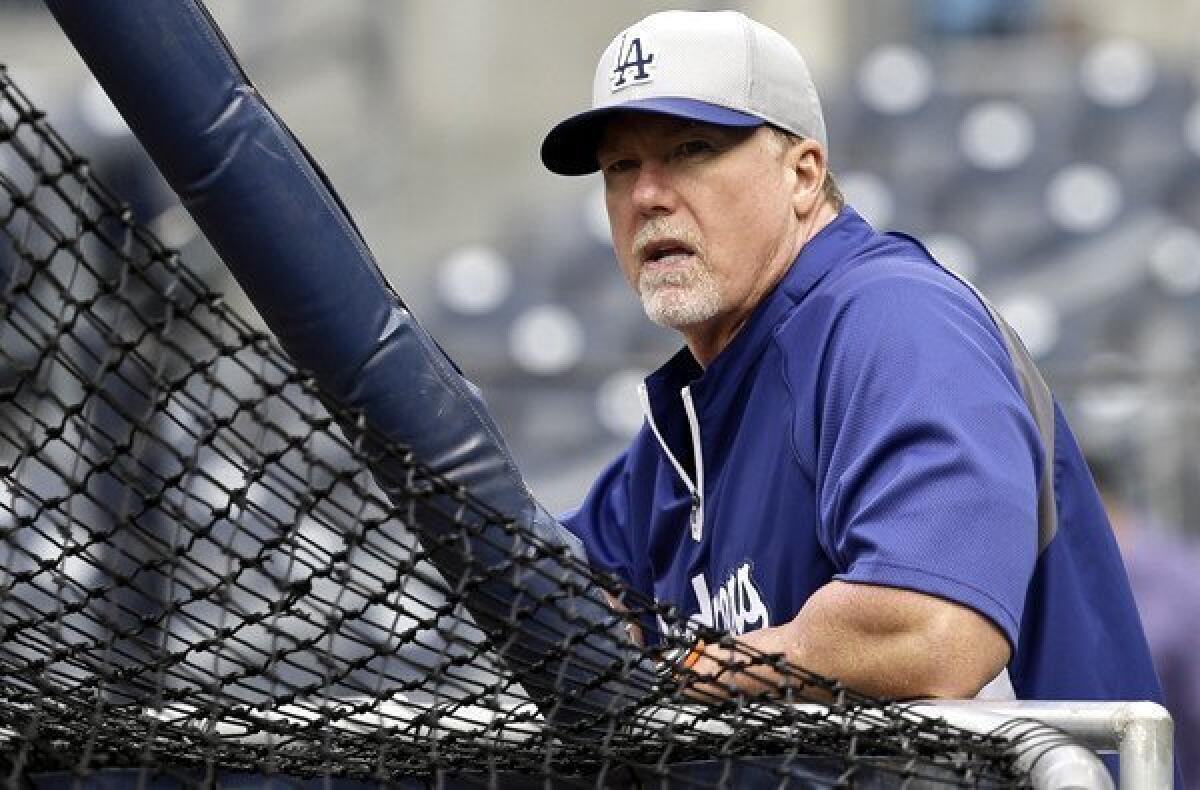Media have to remain vigilant until MLB drug cheating is eradicated

Mark McGwire grew up in the San Gabriel Valley. For him, the guy was Dave Kingman.
“I tried to beg my dad to take us to the games if the Cubs were in town,” McGwire said.
Mark Trumbo grew up down the street from Angel Stadium. For him, the guy was Troy Glaus.
“As a kid coming to the games, you really hoped he might get into one,” Trumbo said.
That is the most magical of moments in baseball, that one crack of the bat, that instant when Mighty Casey takes a swing and launches the ball on a majestic arc. It is high, it is far, it is gone.
There is no sacrifice bunt derby on the night before the All-Star game, no advertising slogan that suggests chicks dig the stolen base. Roy Hobbs did not knock out a light tower with an artfully placed single through the hole.
That sense of wonder has given way to a sense of innocence lost. Chris Davis of the Baltimore Orioles hits monster shots, one after another, and the reaction has gone from “Wow!” to “How?”
Are the days of looking at a slugger and trusting what we see gone forever? Can parents treat their kids to a day at the ballpark with their home run hero without worry that the next day might bring word that the power show was artificially and illegally enhanced?
“It’s up to you guys, the media,” McGwire said.
McGwire has confessed to his use of steroids, has made peace with his exclusion from the Hall of Fame. If baseball is going to move forward, he says, then the media have to move on.
“Major League Baseball has done a terrific job with their testing,” McGwire said. “These guys are tested, probably, 15 or 20 times a year.
“There is no reason why anybody should question Chris. There is no reason why anybody should question any of these guys. They are getting tested.”
McGwire conceded he had not closely followed the Biogenesis investigation, in which 13 players were suspended this month on evidence that did not include failed drug tests.
Roger Maris hit 61 home runs in 1961, a single-season record that stood until McGwire hit 70 in 1998 and Barry Bonds hit 73 in 2001. McGwire, Bonds and Sammy Sosa, the three players to top the Maris mark, each has been linked to steroid use.
“In my opinion, 61 is the record,” Davis said at the All-Star game, “and I think most fans agree with that.”
Said McGwire: “Records are made to be broken. Now, every time a record is broken, we have to question it. But things are in place that basically have stopped it. I wish the best for him.
“For me, personally, it is really up to the media to stop talking about it and understand how good Major League Baseball has done with their testing.”
Davis is on pace to hit 59 home runs, which would be the most for any player since Bonds hit 73. In the previous five seasons, Jose Bautista of the Toronto Blue Jays is the only player to hit 50.
When the Dodgers’ Matt Kemp hit 39 to lead the National League two years ago, it marked the lowest total for an NL leader since 1992, when Fred McGriff of the San Diego Padres hit 35.
“We’re starting to see what this game should look like without some of the help that people have had,” Trumbo said.
Trumbo hits the kind of home runs that dare kids to dream. He has hit the longest home run this season (475 feet) and the hardest (120 mph off the bat), according to ESPN’s home run tracker.
He believes that you can believe in baseball again.
“For me, you just have to look at how strict things are, being a current player that has gotten tested umpteen times this year,” he said.
“You can’t help but have some faith in the system. A guy like Chris Davis could put up 50 or 60 — hopefully, he does — but I think the overall numbers have gone down to the point where this is probably what it’s going to be.”
The media cannot let up on its vigilance just yet, not when the media celebrated the steroid era rather than questioned it, not when the Biogenesis saga proves testing is far from foolproof, not when off-season testing is all but non-existent, not when the players themselves rise to demand a one-year ban, or a lifetime one, for a first offense.
There may indeed come a time when the media moves on.
“It would be nice,” Trumbo said. “It really would. I know that is a lot easier said than done, especially with what has happened extremely recently.
“It’s going to take some time. Hopefully, in a couple years, we can say that is a non-issue.”
None of the steroid users lost a record, or even a single home run. The asterisk was nothing more than a conversation point.
Or was it? If this is the end for Manny Ramirez, released from a minor league contract last week by the Texas Rangers, he would finish his major league career with 555 home runs, 14th on the all-time list.
Six of those 14 — Bonds, McGwire, Sosa, Ramirez, Rafael Palmeiro and Alex Rodriguez — are not getting into the Hall of Fame. There is your asterisk.
Maybe that asterisk, and its aftermath, will help kids believe in the next generation of sluggers. In 2002, as major league players debated whether to accept drug testing at all, a shortstop at Granada Hills High said he could not believe in Bonds and Co.
“I think everyone should be putting an asterisk next to the recent records because of steroids,” the shortstop told The Times. “Something needs to be done.”
The shortstop’s name was Ryan Braun.
Twitter: @BillShaikin
More to Read
Go beyond the scoreboard
Get the latest on L.A.'s teams in the daily Sports Report newsletter.
You may occasionally receive promotional content from the Los Angeles Times.











